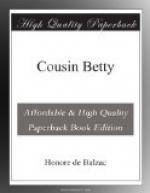“Would you please to give orders, sir, that a poor hermit is to be admitted, just come from the Desert, and who is instructed to beg for contributions towards rebuilding a holy house.”
This apparition, which suddenly reminded the lawyer of a prophecy uttered by the terrible Nourrisson, gave him a shock.
“Let in that old man,” said he to the servant.
“He will poison the place, sir,” replied the man. “He has on a brown gown which he has never changed since he left Syria, and he has no shirt—”
“Show him in,” repeated the master.
The old man came in. Victorin’s keen eye examined this so-called pilgrim hermit, and he saw a fine specimen of the Neapolitan friars, whose frocks are akin to the rags of the lazzaroni, whose sandals are tatters of leather, as the friars are tatters of humanity. The get-up was so perfect that the lawyer, though still on his guard, was vexed with himself for having believed it to be one of Madame Nourrisson’s tricks.
“How much to you want of me?”
“Whatever you feel that you ought to give me.”
Victorin took a five-franc piece from a little pile on his table, and handed it to the stranger.
“That is not much on account of fifty thousand francs,” said the pilgrim of the desert.
This speech removed all Victorin’s doubts.
“And has Heaven kept its word?” he said, with a frown.
“The question is an offence, my son,” said the hermit. “If you do not choose to pay till after the funeral, you are in your rights. I will return in a week’s time.”
“The funeral!” cried the lawyer, starting up.
“The world moves on,” said the old man, as he withdrew, “and the dead move quickly in Paris!”
When Hulot, who stood looking down, was about to reply, the stalwart old man had vanished.
“I don’t understand one word of all this,” said Victorin to himself. “But at the end of the week I will ask him again about my father, if we have not yet found him. Where does Madame Nourrisson—yes, that was her name—pick up such actors?”
On the following day, Doctor Bianchon allowed the Baroness to go down into the garden, after examining Lisbeth, who had been obliged to keep to her room for a month by a slight bronchial attack. The learned doctor, who dared not pronounce a definite opinion on Lisbeth’s case till he had seen some decisive symptoms, went into the garden with Adeline to observe the effect of the fresh air on her nervous trembling after two months of seclusion. He was interested and allured by the hope of curing this nervous complaint. On seeing the great physician sitting with them and sparing them a few minutes, the Baroness and her family conversed with him on general subjects.
“You life is a very full and a very sad one,” said Madame Hulot. “I know what it is to spend one’s days in seeing poverty and physical suffering.”




